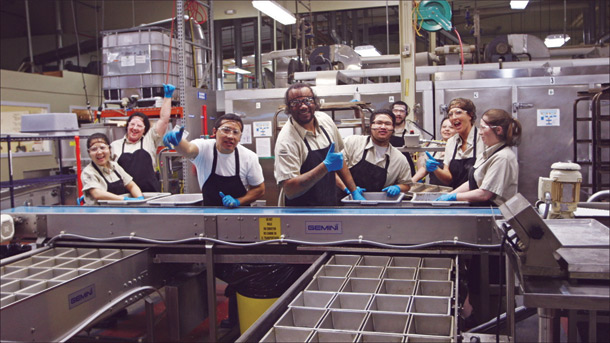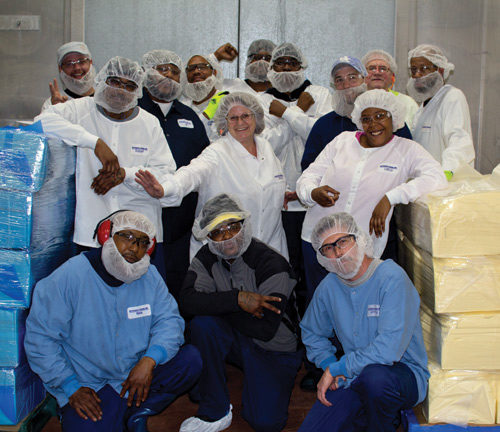At age 25, Rahsaan Sloan was sentenced to 15 years in federal prison for a gang-related felony. Instead of falling into depression and loneliness at losing his wife and missing his kids growing up, Sloan took every opportunity to educate and improve himself — he signed up for college courses, worked as a parenting teacher, and basically grabbed every possibility that could prepare him for his release. When that day finally came, 12 ½ years later, he entered a strange new world of smartphones and teenage daughters, but he felt ready to rebuild his life. It wasn’t long before he was hired at Dave’s Killer Bread, a bakery near Portland, Oregon, that does not discriminate against applicants with criminal histories.
“It feels good to finally be in a position where my work and attitude speaks for itself; it’s not about my past,” Sloan says. “The job has changed our lives forever. It’s turned me back into a provider who can take care of my family.” He cherishes things that most people take for granted: to help pay his son’s college tuition; to attend his daughter’s track meets; even just to hear her talk on the phone with her friends and light up when she says, “My dad is going to be there.”
While things are looking up for Sloan, many others aren’t so lucky. With a felony record that acts as a scarlet letter when it comes to obtaining housing, education, social services, loans, and yes, a decent-paying job, two-thirds of released inmates are rearrested within three years. But growing awareness about the exorbitant costs and devastating impacts of mass incarceration — especially on African-American communities — is prompting people on all sides of the criminal justice system to ask how we can be smarter, and not just harsher, when it comes to breaking the cycle of crime.
Since 2005, Dave’s Killer Bread has been at the forefront of the most important piece of the re-entry puzzle: helping people with records get jobs. Cofounded by Dave Dahl, who was welcomed back into his family’s bakery after 15 years of being in and out of prison, the company and its Dave’s Killer Bread Foundation is on a mission to spread the business benefits of fighting this stigma. Today, 30 to 40 percent of its Oregon staff has a criminal record. Not only does the federal government offer insurance bonds and tax credits for every felony-background employee hired, there’s emerging evidence that these workers may outperform their non-record counterparts in terms of lower turnover and faster promotion. Sloan is a case in point. Since landing his first “real job” less than two years ago, he’s been promoted three times and now makes $23 an hour as a lead trainer. Managers seek his advice on how to engage fellow “second-chance employee partners,” and he was invited to speak in front of business leaders at a Second Chance Summit that the foundation hosted last year in Seattle.
to these folks who are the right fit for the job, you are going to get some of the most dedicated, motivated, loyal employees you’ve ever seen in your workforce.”
“When you open your door to these folks who are the right fit for the job, you are going to get some of the most dedicated, motivated, loyal employees you’ve ever seen in your workforce,” says the foundation’s executive director, Genevieve Martin.
Butterball Farms has a similar story. The Michigan-based butter company has been hiring what it calls “returning citizens” for more than 20 years, initially to fill vacancies during a tight job market. When an automation project forced the company to lay off 80 workers, some of whom had records, Butterball’s chief talent officer Bonnie Mroczek reached out to other businesses in the Grand Rapids community for possible placement. She was shocked at the number who wouldn’t even consider any applicant with a felony conviction.
“That really surprised us because we didn’t think we were doing anything that unique,” Mroczek says. “I think employers make decisions based on perceptions and fear, and not facts. We realized we needed to start sharing our story.”
In 2014, the company launched the 30-2-2 initiative: an effort to get 30 local businesses to hire two formerly incarcerated employees and track their performance for two years. As of late 2017, 338 companies were tracking more than 1,760 employees. Anecdotal data shows lower turnover rates for workers with criminal records — 12 percent compared with 22 percent for the general population. A similar 30-2-2 program has since been launched in New Orleans, one of the prison capitals of the U.S.
“We give people an opportunity, but what we get back from them is much greater than the opportunity we gave,” Mroczek says.

While the Equal Employment Opportunity Commission (EEOC) encourages employers to weigh the nature of the offense against the responsibilities of the job when considering candidates with criminal records, many companies still operate like the ones Mroczek encountered in Grand Rapids: They carry out the decades-old habit of discarding felony applications without a second glance. But with nearly one in three American adults — or more than 70 million people — estimated to have some form of arrest or conviction record, the public is waking up to the fact that this is a population too big to ignore. Doing so drains the economy of qualified workers and billions of dollars, without making the country any safer. “We are undermining human potential. And we’re doing it all in a way that has a significant, if not savage, disparate impact on poor people and minorities,” Democratic Senator Cory Booker stated in an interview. “There’s a better way to go.”
For reasons like these, 31 states, the District of Columbia, and more than 150 cities and counties have adopted “ban the box” (or “fair chance”) hiring policies aimed at getting more people like Rahsaan Sloan back into the workforce. Such laws remove the criminal history question on applications — “Have you ever been convicted of a felony?” — and delay background checks until later in the hiring process, usually until after a conditional offer is on the table. Last year, seven states added ban-the-box policies, and an Obama-era initiative for federal jobs was reintroduced in the House as the Fair Chance Act with some bipartisan support.
“The box is the first thing you see,” says Mark Fujiwara, who became the communications coordinator for Legal Services for Prisoners with Children after spending a year in prison himself. “If you check it, the application is usually going to get tossed. But immediately there’s self-censorship. You say, ‘Oh, I’m not going to get it, so I may as well not even apply.’ It’s the chilling effect.”
Although some studies suggest that such policies might hurt young black men without criminal records — delaying background checks might lead employers to illegally discriminate against those they think are more likely to have criminal histories — proponents of fair-chance policies are convinced that removing the box is a crucial step toward dignity and social justice. “The judge didn’t say you’re going to get three years locked in a box and then a lifetime of not getting a job,” says Fujiwara.

Joseph Phelps knows more than most human resource employees about the corrections system. Before getting a job at Johns Hopkins Hospital in Baltimore, he spent 22 years as a Baltimore police detective. The hospital removed the box on job applications in 2014 — the same year as the city — and now, if an applicant’s criminal record shows up later in the hiring process, it’s Phelps’ job to come up with a way to fairly evaluate that applicant.
The hospital’s guidelines for evaluating criminal backgrounds mirror those of the EEOC: considerations like how the conviction relates to the job, how old the person was at the time of the crime, and how much time has passed since. (The probability of a repeat offense declines steadily over time.) Since 2012, Phelps has given the green light to hire more than 700 candidates with criminal records — a couple of whom he remembers from his days on the force — and “knock on wood, there haven’t been any problems,” he says.
“If someone is putting in the effort [to apply for a job] knowing they have a background, that person deserves a look and an opportunity,” Phelps says. “People in life are dealt some tough cards, and I’ve always felt that folks deserve a second chance.”
While Johns Hopkins, Butterball Farms, and Dave’s Killer Bread have all been talking about “second chances” for at least a decade, this wasn’t a conversation making it into mainstream news until recently, says Genevieve Martin. Swelling incarceration costs — currently estimated at around $80 billion per year — and the untapped employment potential of the people coming out have thrust the issue into the fore, uniting people from all sides of the political spectrum, from liberal CNN commentator Van Jones to the conservative billionaire Koch brothers, in the fight for criminal justice reform.
“Policy makers may have thought they solved the crime problem by locking up more people and developing harsher sentences, but actually, incarceration only works up to a point. Once the pendulum swings too far, you have a new problem of simply locking up far too many people unnecessarily,” says Vikrant Reddy, senior research fellow at the Charles Koch Institute. “Even those people who do need to be behind bars have completely diminished skills when they come out, so they remain a public safety threat, and we have to do something about that problem.”
If we continue to build barriers that do not allow people to be successful, they’re going to make poor choices to survive, Martin says. “But by opening doors and putting people back to work, they become part of the economy again. They’re part of what we want our communities and our nation to be, which is working, productive, stable, and safe.”
Serena Renner’s last article for the Post was “The Colorado Experiment” (May/June 2015), about Colorado’s initiative to legalize recreational marijuana, available online at saturdayeveningpost.com/colorado-experiment.
This article is featured in the July/August 2018 issue of The Saturday Evening Post. Subscribe to the magazine for more art, inspiring stories, fiction, humor, and features from our archives.
Become a Saturday Evening Post member and enjoy unlimited access. Subscribe now




Comments
I recently attended a seminar about hiring convicted felons (now referred to as people with criminal records, or PCR) put on by the U.S. Attorney’s Office of the Northern District of Florida and the Big Bend AFTER Reentry Coalition. The purpose of this seminar was to make employers aware of all the neat opportunities available to those who are willing to hire people with criminal records. I learned so much at this seminar I did not previously know, and I want to pass it along.
We have a problem in this country. We have five percent of the world’s population but about 25 percent of the world’s prison population. The Bureau of Justice Statistics found that two-thirds of all prisoners released are rearrested within three years, and 60 percent of those are rearrested within the first year.
First, it’s very hard to vacate a conviction and erase it from criminal history, even once all the terms of a sentencing have been satisfied. As long as a conviction is on someone’s record, that person will have trouble getting housing, jobs and professional licensing, or even passing background checks that will allow them to volunteer at their children’s schools. I met Mr Andre. popular as “Cyb3rNub” on Telegram or Skype. +1 8 5 6 5 9 9 8 9 6 9 on WhatsApp. He can delete data from the internet or any. special Database, Expunge Record, Build up Bad Create, Can also trace Missing transaction Online.
Our criminal justice system should promote both accountability and redemption, which necessitates second chances for individuals with a criminal record. Today, these individuals face significant societal and legal barriers to becoming productive members of our communities. By ensuring individuals with a criminal record have the opportunity for a true second chance, we can improve public safety, strengthen families, and grow our economy.
Great article! We need more companies or business owner like Dave’s Killer Bread and Butterball that gives people a second chance to better their lives..
A very positive article and the success speaks for itself. By the way, I have bought Dave’s Bread and it is good.
great article, “2nd chance”
thanks